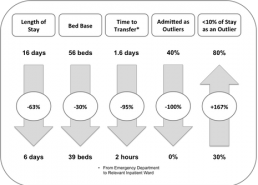
Health and Care
Busting targets and myths by understanding what is really happening and why
In the face of rising demand on their services, health and care providers have been struggling to find further efficiencies and improve patient outcomes.
At the House of Lords on 12 March 2014, Vanguard and Locality launched our newly published report on a study that analysed hundreds of thousands of demands placed on the public and third sectors across multiple localities in the UK over the previous three years.
The report describes how failure demand is the biggest cause of rising demand in health and care providers, not demographics. By using the Vanguard Method to focus on reducing failure demand, health and care organisations have boosted efficiency, unlocked valuable resource and improved patient outcomes.
In Health and Care, Vanguard’s clients have achieved the following astonishing results:
- Sustained underspend in community care budget – cost avoidance of £1.5m in 2013/14
- Referrals resulting in statutory funded packages of care reduced to 10.9% – down from 24.1%
- 28% reduction in residential and nursing care placements
- 46% reduction in contacts into Social Services
- Re–referrals reduced by 46% to 10%
- 30% reduction in assessments
This is beyond integration. We now understand before we access, build relationships rather than transact, take responsibility instead of referring on, and take time to understand what someone needs to live a good life instead of prescribing standard packages of activityJulie Boothroyd, Head of Adult Services, Monmouthshire County Council
- Overall reduction of 36% in non elective admissions to hospital in one GP practice
- 75% of worker’s time now focused on work of direct value to citizens. In the old system 80% of work was waste activity
- Reduced need or no ongoing need for social care support
- Prevention of strain / breakdown for carers
This new way of thinking has created a service which is as different for my patients as night is from day. They are delighted and so am IDr Rosie Benneyworth, GP and Lead for Urgent Care and Cancer Commissioning, Somerset CCG
Inpatient Services

Cost per patient halved
Cashable Savings
- 14% of the whole hospital budget
- 23% of the neurology budget
- 17% of externally commissioned care
I can't overstate how powerful the change in thinking isDr Steve Allder, Consultant Neurologist at Plymouth Hospitals NHS Trust
Transforming Stroke Care
Outpatient Services

Patients said:
- “I have never been seen so quickly”
- “The doctor had time for me”
Staff said:
- “Consultations feel more personal”
- “The clinic feels much calmer”
Laboratory Services
- Significant reduction in the number of routine liver function tests and full blood count tests. Pre-intervention 60% of liver tests were found to be unnecessary.
- 40% reduction in urine specimens from GP practices across the area resulting in a cost saving to the CCG of £200k
- 28% year on year reduction in the number of all biochemistry tests in a single GP practice
- Increased capacity of specialist microbiologists to provide more targeted help to clinicians dealing with complex cases and ability to use tests results earlier to get the treatment right first time
- Reduction in use of antibiotics and reduction in duration of symptoms and recurrent infections
- Reduction in anxiety to patients who were able to get back to normal as quickly as possible, or to better understand what new normal would look like for them
- Significant reduction in incidences of iatrogenic harm
Youth Protection
- Overall savings of 30m euros (£22.9m)
- Cost saving of 12m euros (£9.1m) within the Youth Protection Amsterdam region and 10m euros (£7.6m) for expensive youth care
- 50% reduction in the number of families under the care of the organisation from 8,000 (around 20,000 children) to 4,000
- 61% reduction in protective measures
- 53% reduction in the number of out-of-home placements
- 46% reduction in youth parole measures
- 16% reduction in child custody / wardship
- 28% reduction in referrals to youth care providers
- 75% reduction in unnecessary administration
We are transforming our social care system thanks to the Vanguard Method. We are working with families to understand what really matters to them. As a result, we have halved the number of children needing to go into careErik Gemitsen, Chief Executive of the Bureau for Youth Care, Greater Amsterdam area
Community
- 17% demand reduction
- Recurrent savings projected at upwards of £85m per annum
The results are profound. Citizens previously labelled as lost are starting to live good lives, demand on services is going down and the size of opportunity to reduce costs is staggeringJohn van de Laarschot, Chief Executive, Stoke-on-Trent City Council
Children’s Services
- 92% reduction in time from referral to the provision of service
- 50% reduction in failure demand
- The old system – 80% of worker’s time spent on paperwork and writing reports; the new system – 80% of workers time spent face to face with the child and their family
- Better for children – children only need to see one person (rather than 15)
Adult Services
- The old system took an average of 62 days simply to assess needs. The new system understands people and their needs and provides the right help on average within 49 days
- More effective assessment – ‘right first time’ increased from 52% to 90%
- More efficient assessment – 85% reduction in cost of assessment
- £3m savings by designing out waste work
- £2.2m saving in residential homes budget






